A Changemaking Presidency
As she embarked on the changemaking work of leading American University as its 15th president in June 2017, Sylvia Mathews Burwell immediately knew that the place—and its people—were special.
“We’re a university of strivers and dreamers, of activists and artists, of scholars and servant-leaders,” she said during her inauguration on April 12, 2018—a beautiful, Washington spring day that evoked the excitement of new beginnings. “We realize that when we all contribute, we all succeed. We are all, quite literally, one AU.”
For the last six years, Sylvia has partnered with the AU community to advance groundbreaking research and scholarship; enhance student thriving; foster an environment of inclusion, diversity, dignity, and respect; champion innovative sustainability practices; and make lasting impacts throughout DC, across the country, and around the globe. Together, our world-class faculty, dedicated staff, extraordinary students, and accomplished alumni—145,000 strong—have tackled the world’s most pressing issues and navigated unprecedented challenges.
And that work will embark on a new phase, as Sylvia announced on August 8, 2023, that she will complete her time as president of American University in June 2024.
“Sylvia came to AU at a moment when the university was poised to build on a decade of growth and take its next step forward as a leading institution in Washington, DC, the nation, and the world,” said Gina Adams, SPA/BS ’80, chair of the Board of Trustees. “She embraced that opportunity, providing bold direction, personal caring, and an optimistic vision for AU that leveraged one of our greatest strengths—our community of changemakers.”
Just as she built on the strength and momentum of her predecessors—including former president Neil Kerwin, SPA/BA ’71—Sylvia, who arrived on her first day at AU on a bike, will conclude her service as president with AU uniquely positioned for the next cycle of changemaking and impact.
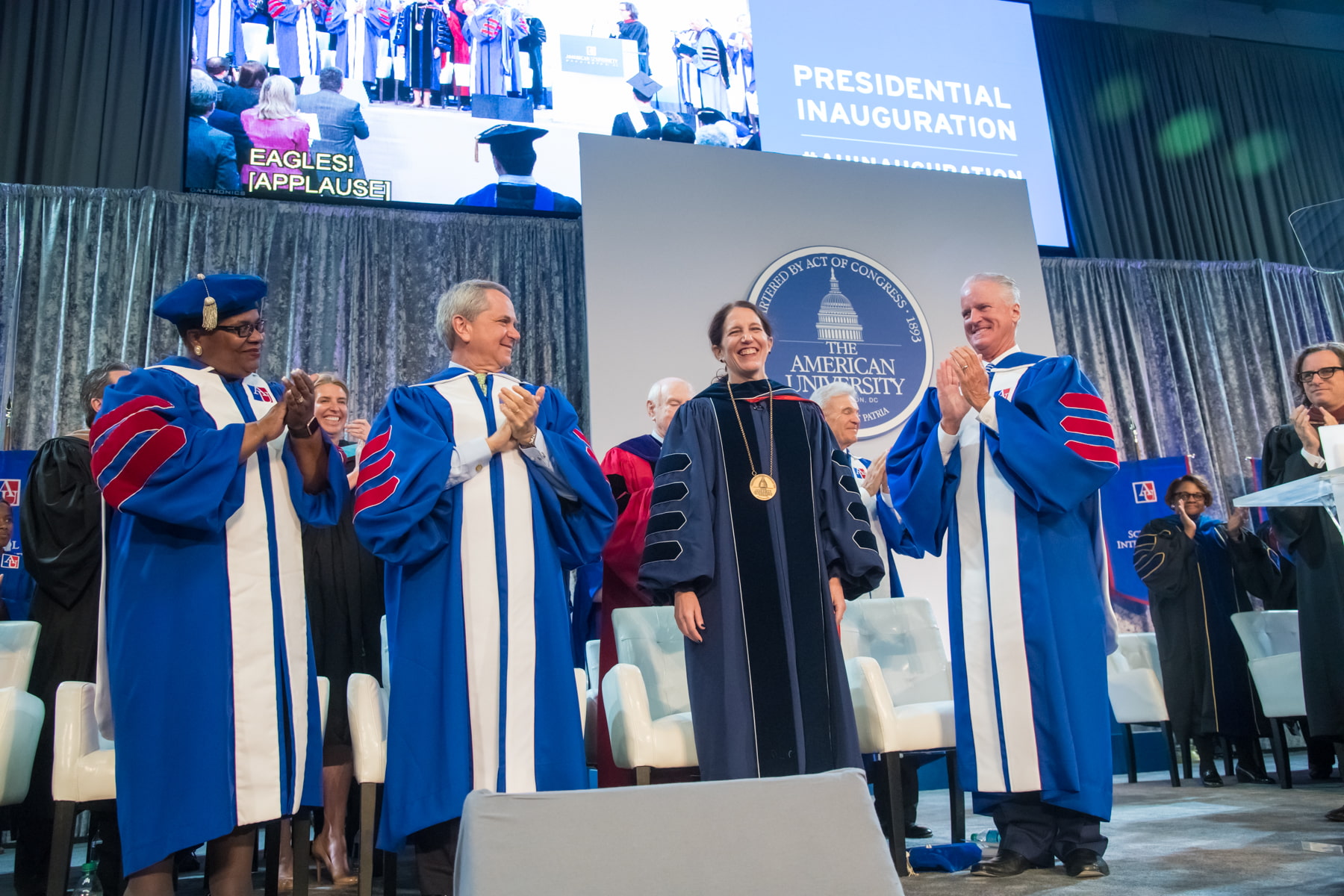
As she said during her inauguration, when throngs of AU community members gathered in Bender Arena to celebrate the first woman to lead the institution: “Our past does not confine us. It propels us forward toward an uncharted future with nearly boundless opportunities and challenges.”
Both have defined the career of Sylvia Burwell.
From 2014 to 2017, she served as the 22nd secretary of the US Department of Health and Human Services (HHS), leading the trillion-dollar agency during the Ebola and Zika outbreaks and undertaking the most comprehensive reform of the nation’s health care system in a generation. Before that, she worked as director of the Office of Management and Budget, negotiating a two-year budget deal with Congress in the wake of the 2013 government shutdown. Sylvia also held executive positions at the Walmart Foundation and the Bill and Melinda Gates Foundation in the other Washington—where she met her husband, Stephen Burwell. They have two children, Helene and Matthew.
Sylvia is the proud daughter of Hinton, West Virginia, a town of 3,000 in the southeastern corner of the Mountain State that instilled in her the importance of community. “She brings the values of caring about your neighbor and ordinary folks to some of the biggest and most complex challenges of her time,” President Barack Obama said of Sylvia on April 11, 2014, the day he nominated her to lead HHS.
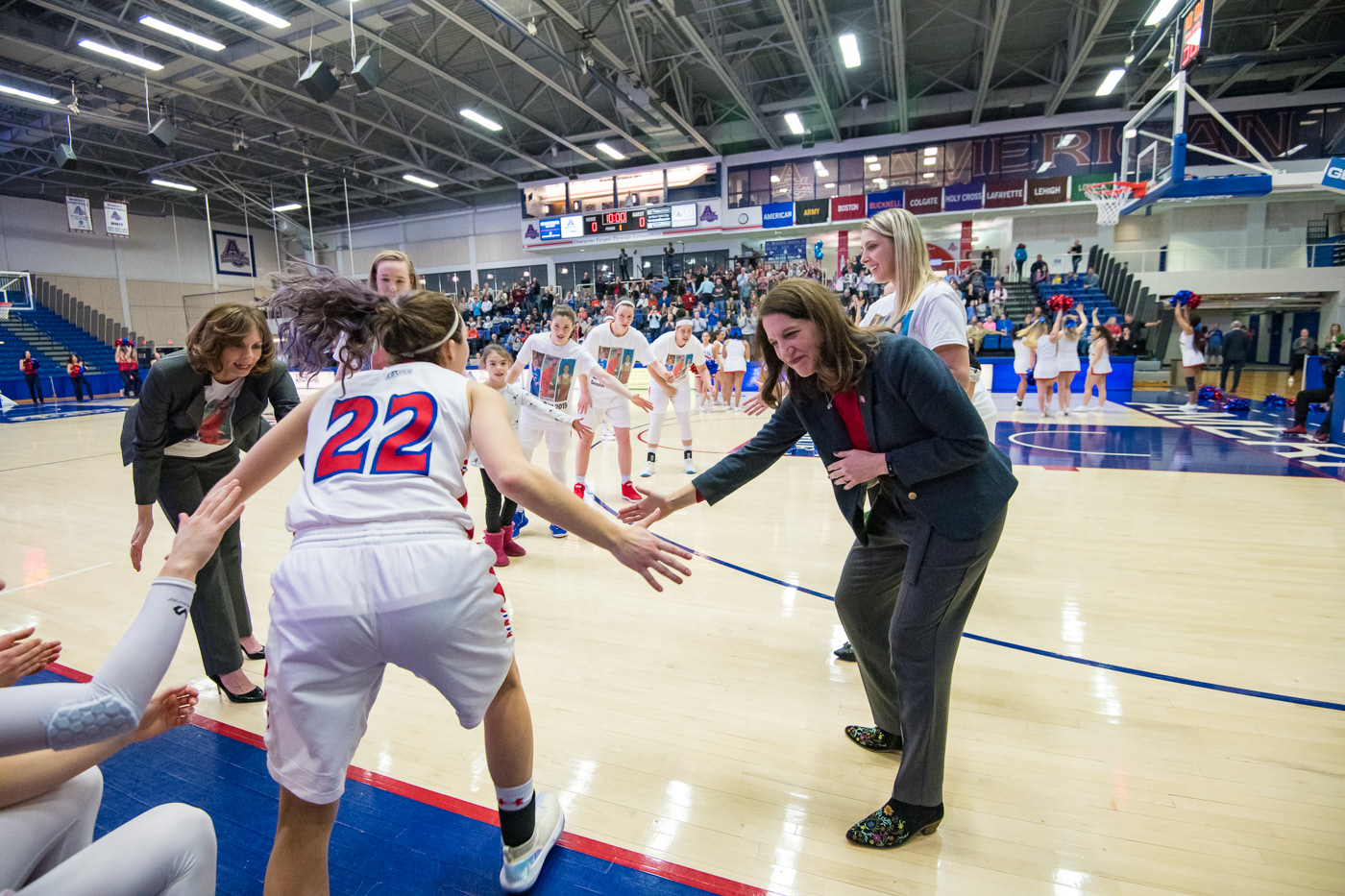
That spirit of community and shared purpose defines AU under Sylvia’s leadership. Known for her selfies on social media, Sylvia’s presence on campus was grounded in personal connection and engagement: walking across the quad each day, hosting pop-up study breaks during finals and monthly breakfasts with faculty and staff, and even serving as guest coach of the women’s basketball team in their January 2018 match against Boston University. (Sylvia played forward in high school and lettered in basketball while she was a Rhodes Scholar at Oxford, where she was coached by former national security adviser—and close friend—Susan Rice.)
Sylvia planted flowers alongside community members during the annual Campus Beautification Day, engaged with alumni during coast-to-coast campaign events, and reminded graduates every year that celebrating their accomplishments—in her signature AU red and blue cowboy boots, a nod to her West Virginia roots—was the absolute best part of her job.
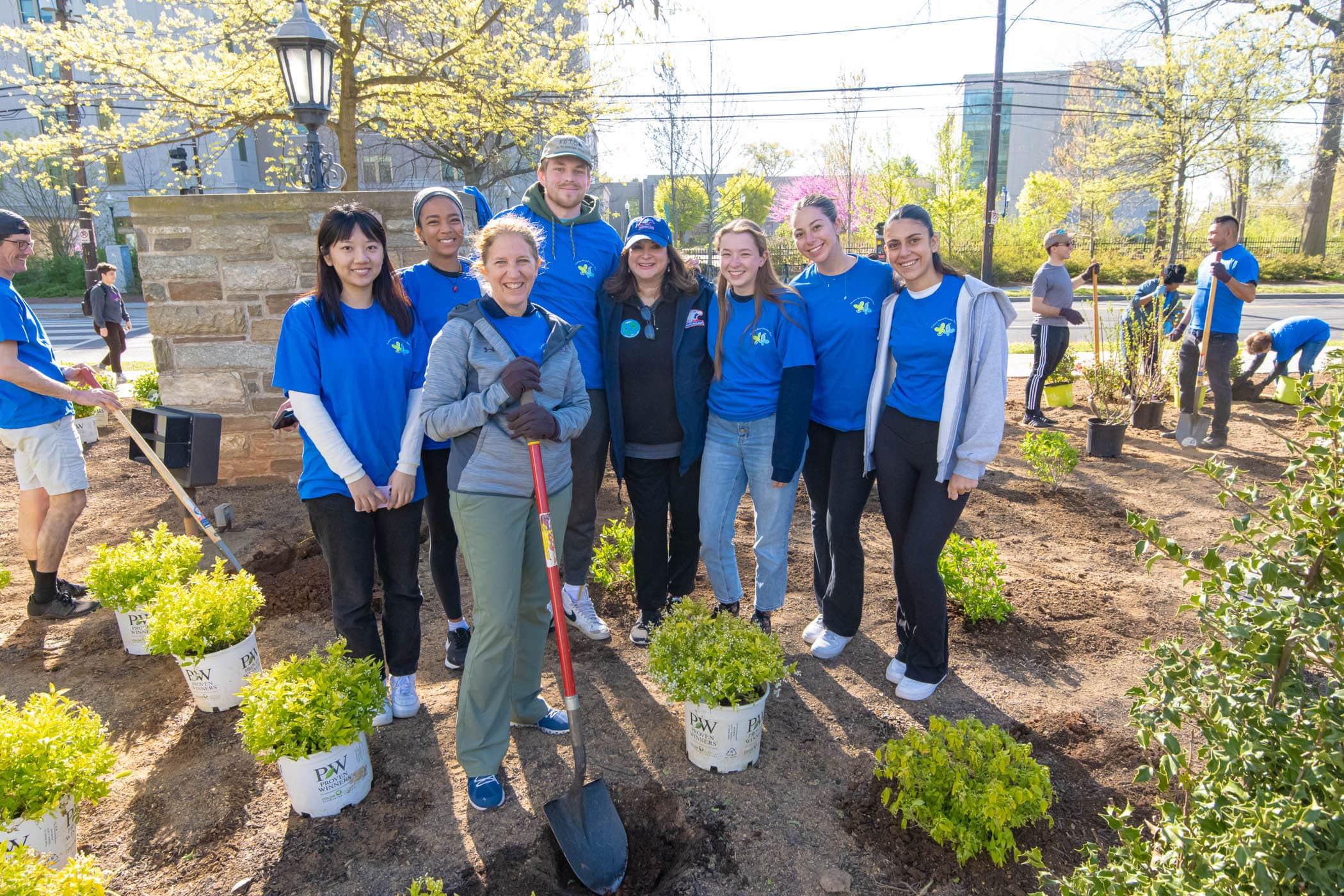 “I am deeply proud of the work that takes place in our community: the student experience we offer, our faculty’s world-class research and scholarship, the alumni who are making a difference,” Sylvia said. “When I first came to AU, I knew right away this community was exceptional. It [has been] inspiring to be a part of this journey.”
“I am deeply proud of the work that takes place in our community: the student experience we offer, our faculty’s world-class research and scholarship, the alumni who are making a difference,” Sylvia said. “When I first came to AU, I knew right away this community was exceptional. It [has been] inspiring to be a part of this journey.”
Changemakers for a Changing World: Boldly Embracing Opportunities for Greater Impact
Sylvia joined AU amid a rapid transformation in higher education and embraced the moment to help AU lead the way into a bright future. Embarking on a listening tour that featured more than 1,000 community conversations, Sylvia engaged the AU community to chart a path that helped define who we are as a community and an institution. The result, building on our legacy of leadership, scholarship, and service, was the Changemakers for a Changing World strategic plan. A road map for our work, the plan has served as our guiding star and differentiated AU based on the passion and purpose of each of our changemakers.
Since the plan’s 2019 launch, our expert faculty’s scholarship and research has grown exponentially in scope and impact, with externally funded research more than doubling over the last three years to $51 million.
“Sylvia has put tremendous emphasis on research and interdisciplinary approaches to the critical challenges of our time. Our work is truly changemaking—and we’ve only just begun,” said Lilian Baeza-Mendoza, College of Arts and Sciences (CAS) professor, immediate past chair of the Faculty Senate, and current chair of the committee on diversity, equity, and inclusion.
AU landed several transformational grants in the past three years, including a history-making, five-year, $15 million award from the National Science Foundation (NSF) to curb wasted food and reimagine a more sustainable, equitable, and resilient food system. Katie Holton, a health studies professor in CAS, also received a $6.3 million grant from the Department of Defense to explore how a low glutamate diet can alleviate chronic pain in Gulf War veterans.
Researchers from the School of Education (SOE)—which became a standalone school in 2019—and Martha's Table are among those working on a three-year, $5 million partnership grant from JPMorgan Chase to support career development for DC childcare workers and help them obtain the necessary credentials. SOE professor Emily Grossnickle Peterson also received a prestigious, $1.3 million Faculty Early Career Development award from NSF to explore the relationship between curiosity and student learning outcomes across STEM fields.
“Our faculty’s expertise and strengths help define an AU education,” Sylvia said. “As scholar-teachers, they ask the right questions, addressing critical issues and seeking answers that go far beyond our campus.”
Sylvia’s tenure featured the launch of several new research hubs, including the Center for Environment, Community, and Equity—a bold assembly of researchers from across campus working at the intersection of environmental studies and social justice—and the Institute for Immersive Designs, Experiences, Applications, and Stories, funded by a $1 million NSF grant. The Immigration Lab and the Inclusive Tech Policy group have deepened AU’s impact and expertise with an eye toward equity and diversity, while SPA’s First Ladies Association for Research and Education is the only center of its kind in the country.
Engaging our communities was a core pillar of plan, including on our campus, in Washington, DC, and beyond. Sylvia led AU’s engagement in higher education, serving on the board of the American Council on Education, and she worked with faculty, staff, and student leaders as AU crafted a new policy and values statement on freedom of expression. WAMU 88.5 also had the highest market share in the District.
Hands-On Learning: A Unique AU Educational Experience
Experiential learning is at the heart of the AU experience. Sylvia worked with academic leaders across the university to build on the core strengths in AU’s teaching and learning approach and continue enhancing how we prepare students for success in their chosen pursuits.
Among the more than 200 hands-on experiences available to Eagles: a first-of-its-kind course launched by Kogod in fall 2022 that challenges students from across campus to achieve sustainable gains through sustainable investments in environmental, social, and governance (ESG) funds. The Board of Trustees will invest 1 percent of AU’s endowment—about $9 million, based on current market values—in ESG funds recommended by the class.
Many of our academic programs are ranked at the pinnacle of their fields nationally, including the School of Public Affairs (SPA), which is 10th in the nation among schools of public affairs for the second year in a row, according to US News and World Report. SPA jumped four spots in five years and is the top school of its kind in Washington.
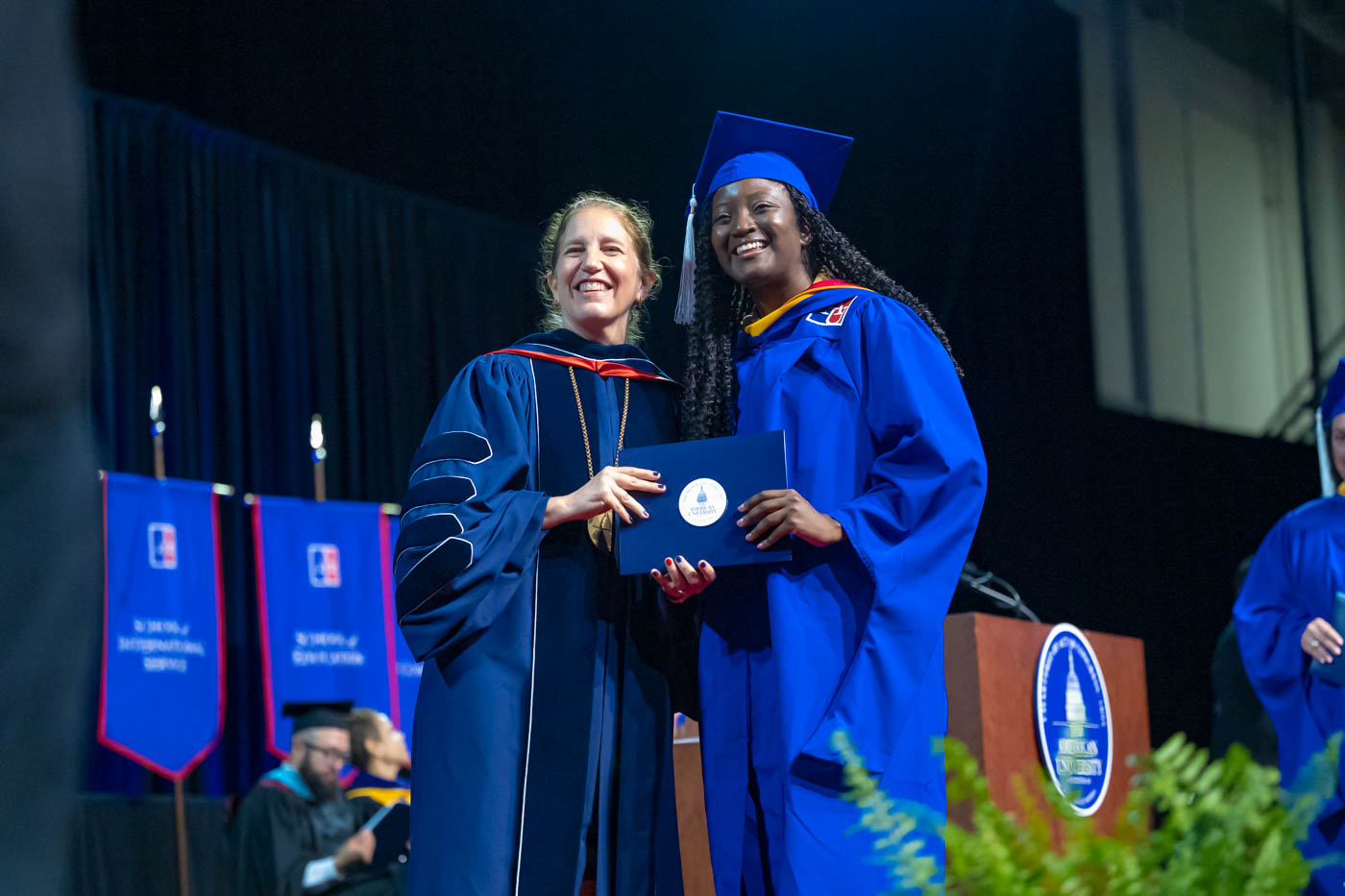
This summer, Kogod received the 15th annual Page Grand Prize for best sustainability curriculum in the country, while the Washington College of Law’s (WCL) clinical law program is No. 1 in the country, per US News and World Report. Also this year, the School of International Service (SIS) became the first university partner to team up with the Pat Tillman Foundation to offer renewable matching funds for any SIS student selected for the nonprofit’s flagship Tillman Scholar program.
Meanwhile, the School of Communication (SOC) partnered with ESPN in 2022 to create an inaugural fellowship that imbeds a graduate student with the sports network’s investigative and enterprise journalism unit. Eight SOC graduate students were also part of the Washington Post reporting team that won the 2022 Pulitzer Prize for Public Service for coverage of the January 6 attack on the US Capitol.
And last September, AU’s first-year experience was ranked 12th in the nation—up 27 spots from the previous year—according to US News and World Report. AU also ranked 7th for study abroad, 8th among undergraduate international business programs, 17th for service learning, 36th for best undergraduate teaching, and 41st among best colleges for military veterans.
Living Up to Our Values: The Plan for Inclusive Excellence
Change takes time and requires many hands. Launched in January 2018 as the first piece of our strategy, AU’s Plan for Inclusive Excellence catalyzed efforts to build and support a diverse and equitable community. Sylvia would often say that we know that AU cannot be truly excellent without being truly inclusive and she made this work a central pillar of the university’s efforts.
The first phase of the plan—grounded in survey data and input from more than 1,000 students, faculty, and staff—established a strong foundation. It included more inclusive and equitable practices, frank assessments of the challenges we face, and programs to bolster all community members’ sense of belonging.
The second phase of the plan is centered on advancing racial equity, from increasing access to educational opportunities to building an antiracist community that fosters innovation. And although this work will never be fully done—diversity, equity, and inclusion (DEI) are a lifelong pursuit—we have made tremendous strides together.
A critical piece of this work is ensuring that every member of our community feels seen and heard. To that end, 4,068 Eagles have recorded the pronunciation of their names through NameCoach—launched campus-wide in 2021—and 8,170 individuals entered their chosen names, pronouns, or gender identities through AU’s new self-service system. The university now boasts seven faculty-staff affinity groups, and in June 2022, the LGBTQ+ group hosted the inaugural pride flag raising ceremony on campus. AU introduced Black Affinity Housing in Roper Hall in 2021, and the university is also working to foster indigenous spaces on campus, hosting a summit on the issue in November 2022.
AU’s efforts have focused intensely on access and equity. During Sylvia’s administration, we established new undergraduate admissions partnerships aimed at welcoming into our community more veterans, first-generation college students, and those from low-income backgrounds. In 2020, the university dedicated $3 million to the District Scholars Program, awarded annually to high-achieving students with significant financial need who attended DC’s public and public charter high schools. The first cohort of District Scholars will graduate in spring 2024.
In 2022, 65 percent of AU’s new tenure-line faculty and 40 percent of new term faculty self-identified as people of color. The university has also made significant strides to diversify senior leadership, 60 percent of whom are women and people of color.
Equity-based fundraising has increased 17-fold since the first year of the Change Can’t Wait campaign, and an innovative collaboration between the University Library and the Offices of Financial Aid, Inclusive Excellence, and Information Technology has helped close the digital divide on campus by distributing 120 laptops to students who couldn’t otherwise afford them.
AU’s Antiracist Research and Policy Center partnered with the White House Historical Association to create a two-year Public History Fellow in the History of Slavery and Its Legacies. The inaugural fellow, Mia Owens, CAS/MA ’22, created a virtual subject guide for students and researchers on the historical influences of slavery on AU.
Faculty also landed prestigious grants that fuel our own DEI efforts, along with those of other institutions. A $1 million, NSF ADVANCE grant supports gender and racial equity among STEM faculty, $1.3 million NSF grant funds SOE’s examination of undergraduate Black students’ postsecondary STEM experiences, and $700,000 award from Bill and Melinda Gates Foundation advances SOE’s playbook for adopting equity-based teaching. Finally, together with the university’s outstanding inclusive excellence team, Sylvia was named the 2023 Trailblazer in Gender Equity and Diversity by the Women Business Collaborative. And in 2022, AU received the Inclusive Excellence Award from the National Association of Diversity Officers in Higher Education—which signals not that our work is done, but that we continue to head in the right direction, toward a more diverse and equitable future.
Change Can’t Wait: The Historic Campaign to Transform AU
Our $500 million Change Can’t Wait comprehensive campaign is transformative in its scope and impact. Sylvia launched the university’s first fundraising campaign in nearly two decades, securing the fuel that propelled our strategy forward and providing AU with a financial foundation for decades to come.
“AU has long been home to changemakers who tackle complex, interconnected challenges,” Sylvia said after the May 2021 public launch. “This campaign amplified our impact and helps us share our strengths with the world.”
Now pushing toward completion, the campaign has raised $415 million to date, rallying the AU community around our shared goals: to elevate, inspire, and lead.
Our progress and impact to date includes: $126 million for financial aid, student support, and the campus environment; $135 million for research and faculty support and new centers and institutes; and $154 million for programs that support AU’s work with DC, unrestricted funds, and WAMU 88.5.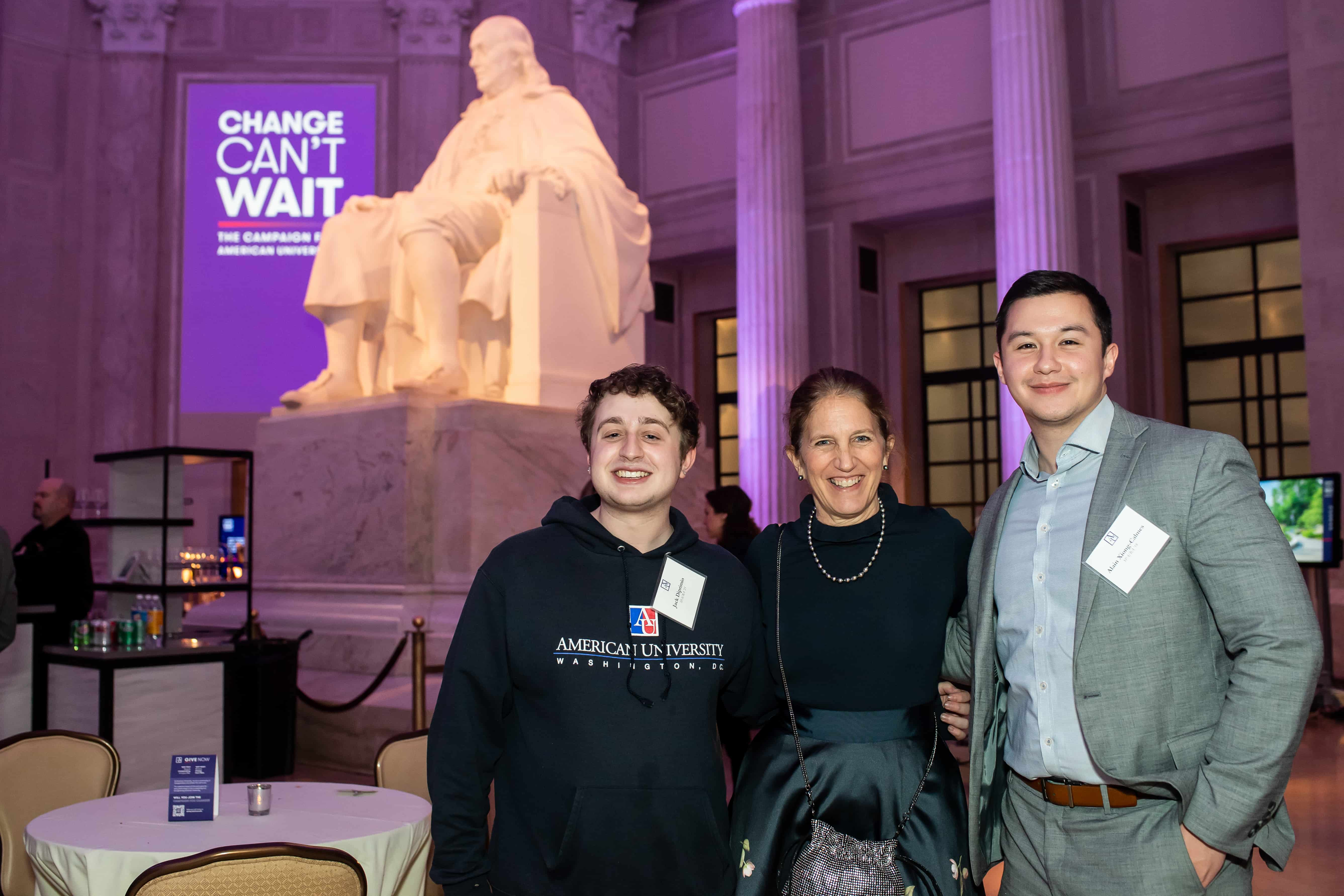 AU has created or expanded 140 scholarships to support students on their academic, social, and personal journeys. We launched the Elevate Scholarship Initiative to raise $25 million in unrestricted scholarship funds for undergraduates. To date, more than 1,600 donors have given more than $5 million, and AU is matching those philanthropic investments with an additional $25 million—doubling the impact of this important endeavor.
AU has created or expanded 140 scholarships to support students on their academic, social, and personal journeys. We launched the Elevate Scholarship Initiative to raise $25 million in unrestricted scholarship funds for undergraduates. To date, more than 1,600 donors have given more than $5 million, and AU is matching those philanthropic investments with an additional $25 million—doubling the impact of this important endeavor.
We have endowed eight faculty positions, including the Trone Family Eminent Scholar Chair in Neuroscience and Behavior, held by CAS Distinguished Professor Terry Davidson, whose research is poised to revolutionize our understanding of addiction and other cognitive disorders. And we have raised more than $32 million for key capital projects such as the East Campus; state-of-the-art Hall of Science, which opened in 2020; and Meltzer Center for Athletic Performance—the cornerstone of AU’s planned Student Thriving Complex.
The university is committing $109 million to the complex—the largest investment in student thriving in AU’s history—which ensures that Eagles have what they need to thrive: physically, mentally, and emotionally. Nestled in the heart of campus, the complex includes renovations to Mary Graydon Center and the new Student Well-Being Commons, which will provide students with designated space to gather and engage.
The Meltzer Center, named by a generous $15 million gift from trustee Alan Meltzer, CAS/BA ’21, and his wife, Amy, is the first new athletics and recreation construction on campus in more than 30 years. Board chair emeritus and current member Jack Cassell, SOC/BA ’77; Denise Cassell; and the Bender Family Foundation also made foundational gifts to the Meltzer Center.
The campaign has also fueled the establishment or naming of four of AU’s most distinctive centers and institutes, which raise the university’s profile, shine a light on the strengths of our community, and amplify our collective impact. They include the Shahal M. Khan Cyber and Economic Security Institute, Meltzer Schwartzberg Center for Israel Studies, Veloric Center for Entrepreneurship, and Sine Institute for Politics and Policy, which marks its fifth anniversary this fall.
The Sine Institute, which Sylvia will join as a distinguished lecturer after she concludes her time as president, has fast become an AU institution, bringing renowned fellows to campus, including members of Congress, former governors, journalists, playwrights, and community advocates.
The American Dream Is Green: Leading Sustainability Efforts in Higher Education
Not only were we the first to do it—we did it two years ahead of schedule. Sylvia accelerated commitments that AU made to enhance our sustainability, and in April 2018, AU achieved carbon neutrality, becoming the first university in the United States with a net-zero carbon footprint.
The milestone—equivalent to taking 10,000 cars off the road for a year—built on the yearslong, campus-wide effort “to act on our values and lead into the future,” Sylvia said. “We wanted to demonstrate leadership and innovation in addressing the serious social, economic, and environmental issues associated with global warming.”
AU’s innovative approach to carbon neutrality focuses on measures that directly shrink our carbon footprint. Campus electricity is 100 percent renewable and the shuttle bus fleet runs entirely on biodiesel; AU also boasts 10 LEED-certified buildings and seven solar panel installations.
Two years after achieving its historic first, AU notched another green victory, divesting from fossil fuels in the endowment. The university announced it had sold $350 million in commingled funds and index funds to complete the divestment on April 20, 2020—the 50th anniversary of Earth Day. The idea for Earth Day was hatched at Airlie, AU’s 300-acre property in Warrenton, Virginia, which produces 20,000 pounds of produce a year to feed our students and the greater DC community.
An updated sustainability plan—launched in 2021 and featuring goals around environmental justice, wellness, green buildings and cleaning, zero waste, and more—guides our community’s efforts now and into the future.
AU’s mandate to reduce overall campus waste 20 percent by 2030 is particularly ambitious, as it requires us to bolster efforts around recycling, reuse, and composting. Even still, we are making significant strides toward that next important milestone.
In fall 2022, 20,000 pounds of compost were collected across campus, and new reusable takeout containers distributed to about 4,000 students on meal plans diverted 2,571 pounds of waste from landfills. And in May 2022, Project Move Out—a collaboration between Facilities Management and the Student Zero Waste Club—donated three tons of home goods and more than two tons of clothing to Mobile Hope, a Northern Virginia nonprofit that supports at-risk youth and those experiencing homelessness. Another 750 pounds of nonperishable food items were distributed to Mobile Hope and the AU Market, which serves students who are food insecure.
In February, Kogod—building on the reputation of its flagship master’s in sustainability management, the school’s fastest-growing graduate program—launched the Gamechangers in Sustainability speaker series. The yearlong program, which brings to campus eight innovative Fortune 500 CEOs, small-business founders, and investors who are making an outsized impact on sustainability, kicked off with Honest Tea cofounder Seth Goldman.
Adapting and Excelling: COVID Ushers in a New Normal
Our Changemakers for a Changing World strategic plan took on new meaning when COVID-19 hit. While the unprecedented personal and public health struggles were daunting, the AU community stepped up and said, “challenge accepted.”
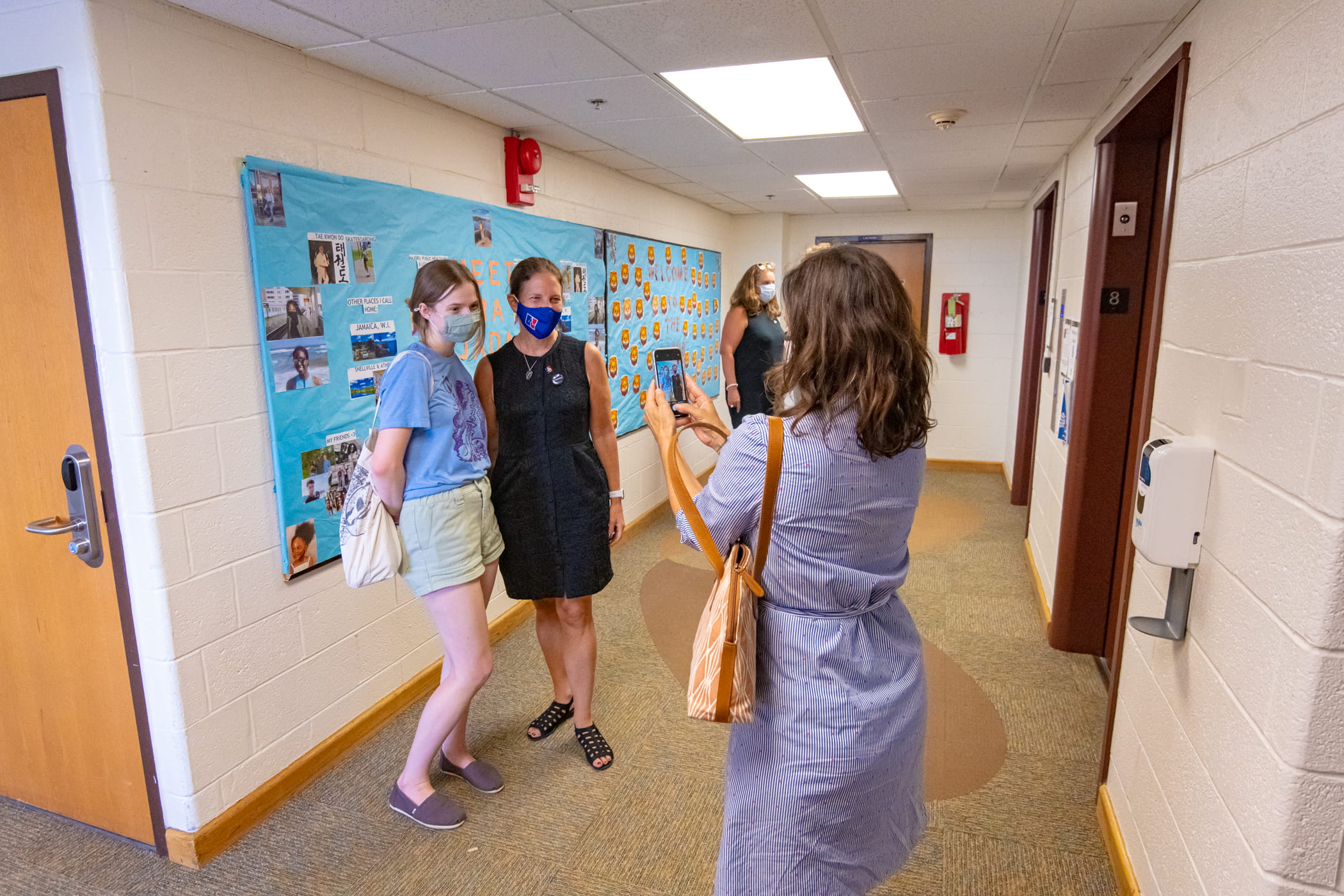
With grace, empathy, and creativity, we adapted and innovated, reimagining how we learned, worked, and lived. Though we were apart for a time, our commitment to our community never wavered—even as the pandemic ushered in rocky economic conditions. While other institutions faced personnel cuts, AU focused on keeping our community whole—avoiding layoffs, paying health benefits for contract workers, and resuming university matching contributions to retirement benefits a month ahead of schedule.
“The last few months of sacrifice prove that when we come together for a cause greater than ourselves—the safety and well-being of our greater community—we are infinitely stronger together than apart,” Sylvia said in May 2020 during AU’s first virtual commencement ceremony, which has been viewed 25,000 times.
After 18 months of Zoom career fairs, dissertation defenses, and lectures, we finally came back together in August 2021—masked but smiling. AU’s COVID policy, which required all community members to be vaccinated and boosted, provided free testing, isolation housing, and supports for anyone in the community who contracted the virus. Thanks to vigilant masking, robust testing, and near-universal vaccinations rates, AU’s infection rate stayed low, even as we moved back to an in-person model.
“In the throes of COVID, Sylvia embraced a spirit of innovation and led the institution to a better place. Her leadership propelled us toward a stronger future,” said Jennifer Tether, associate director of operations and strategic communication for SPA’s Key Leadership Program and chair of AU’s Staff Council.
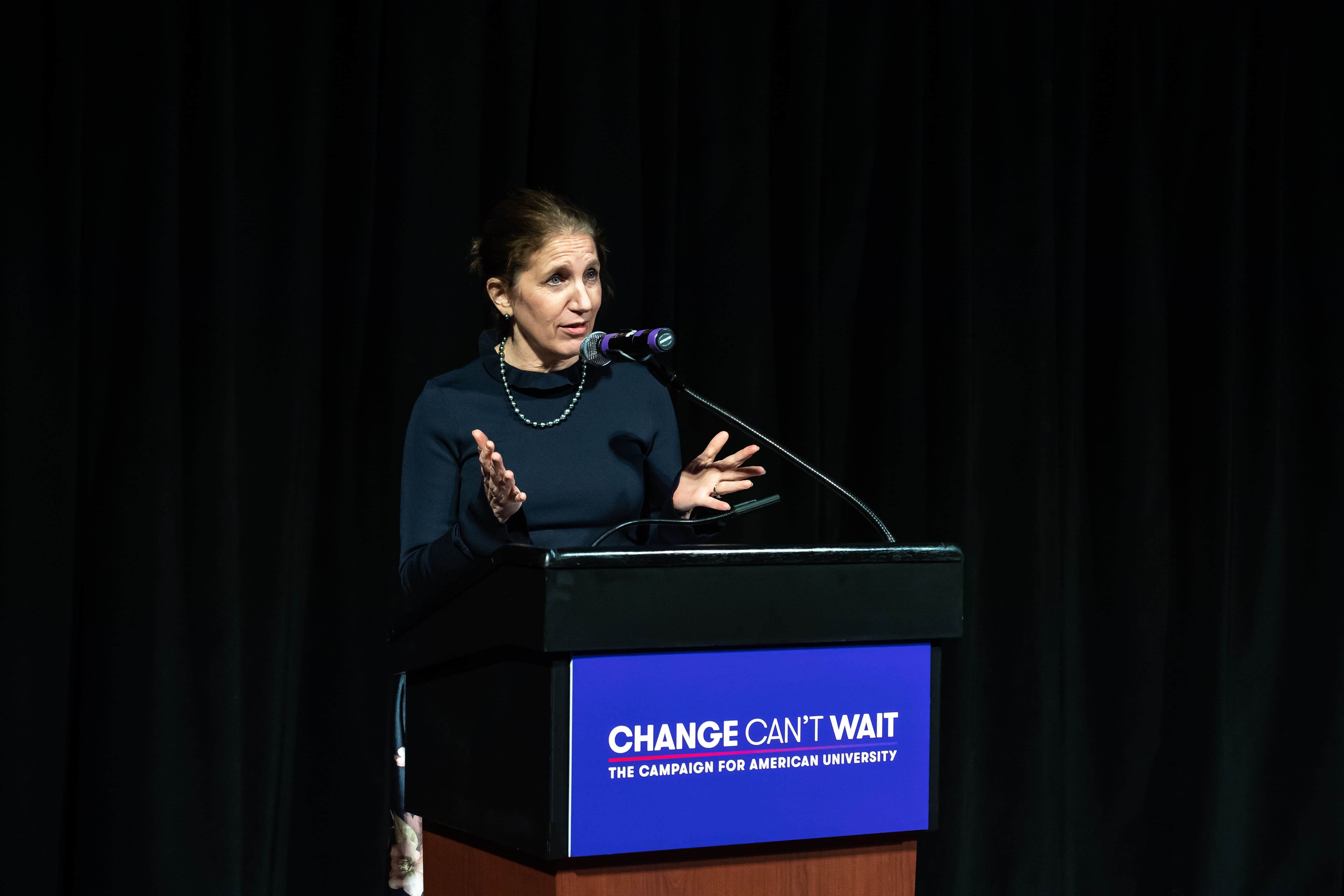
“Despite the unprecedented challenges of the past few years, we stayed focused on our mission, and we emerged as a place that refused to be held back,” Sylvia said during a Change Can’t Wait campaign event in Philadelphia in March 2023. “It hasn’t always been easy—nothing in life that’s worth anything ever is. But, because we came together as a community to confront those challenges, we’ve only gotten stronger and better.”
A Rock-Solid Foundation: Preparing for AU’s Next Chapter
American University is the strongest it’s ever been since we were charted by Congress in 1893—and as we embark on the search for our 16th president, we are poised for even greater impact.
Our endowment has grown by approximately 60 percent to about $950 million; we are closing in on our history-making, $500 million Change Can’t Wait goal; and our campus plan ensures that student thriving is at the center of our growth and development over the next 10 years. The groundbreaking work of our faculty has positioned AU as a research institution on the rise. Our changemaking students and alumni are living lives of purpose and working to build a more equitable, just, and sustainable world. And our dedicated staff are the glue that holds our extraordinary community together.
American University is grateful to Sylvia Burwell for her vision, her expertise, and her drive, which has propelled our community to ever greater heights. And we are heartened that even after her presidency draws to a close in June, she will remain connected to the community of changemakers that she has for seven years cultivated and celebrated.
Once an Eagle, always an Eagle.
